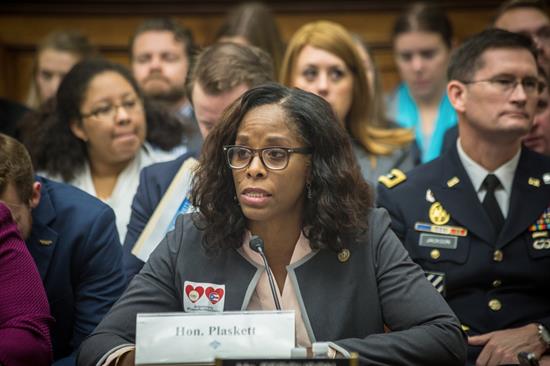Testimony of Congresswoman Stacey Plaskett (VI)
House Transportation & Infrastructure Committee
Hearing: “Emergency Response and Recovery: Central Takeaways from the Unprecedented 2017 Hurricane Season”
2167 Rayburn House Office Building
November 2, 2017. 10:00am
Chairman Shuster, Ranking Member DeFazio, Members of the Committee, thank you for the opportunity to testify on the important matter of disaster response and recovery.
On September 6th, Hurricane Irma wreaked havoc on the islands of St. John and St. Thomas. Two weeks later on September 20th, the island of St. Croix was devastated by Maria, the second category 5 hurricane to hit the U.S. Virgin Islands.
The people of the Virgin Islands have lost their homes and possessions. Business has been lost along with hospitals, schools, utility systems and vital infrastructure.
The President and leaders in Congress have committed to Americans in the territories that they will receive the support they need. The islands were completely cut off from the world until the air and sea ports could at least resume basic operations. I will remain hopeful, yet vigilant, in my work to see that Congress delivers on promises to support the Virgin Islands.
The disaster legislation passed thus far has provided some necessary support. I was pleased to see $5 billion included in the latest package to provide the territories with additional liquidity assistance, and flexibility with local-match requirements, given the impact of the storms on our local government’s ability to generate revenue.
There is no substantial revenue being generated in the Virgin Islands right now. Our tourism-related economy, estimated at 50% of GDP, is gone. We will miss this year’s season at the least. For example, Caneel Bay, the largest employer on St. John and one of the top resorts on the island, has estimated that it will take two years for them to rebuild.
Much more will be needed. In terms of FEMA programs, we will need cost-sharing waivers for permanent assistance under Categories C through G (especially those for roads, bridges and utilities), and a 100% federal share for Hazard Mitigation. We will need temporary waiver of the local-match for Other Needs Assistance. We need a suspension of the cap on disaster housing assistance – one to at least double it. Currently the maximum amount of disaster housing assistance is inadequate in a high cost, highly-damaged area like the Virgin Islands.
The islands are also in need of other important recovery funding left out of the most recent disaster bill. For example, it did not include economic development programs, nor additional support for repair of our water infrastructure, seaports, airports, and roadways, all of which has been included in previous disaster relief legislation. With an economy that primarily relies on tourism, the Virgin Islands depends heavily on this infrastructure.
Given the catastrophic level of damage suffered, the recovery of our islands will hinge on the level of support from Congress for infrastructure rebuilding. Both hospitals devastated, eight schools destroyed.
Furthermore, we will be in need of regulatory relief in our rebuilding. I urge that this Committee consider options for prioritization of disaster-affected areas in the permitting done by the Army Corps, NOAA, and other agencies, so that we may no longer face permitting backlog that has delayed important projects we need to grow our tourism economy.
Our needs are great, and it’s partly a result of issues that have been long standing. Our hospitals have been chronically underfunded for decades, and our Medicaid is block granted at an amount that has no relationship to local needs. Our match has been limited to an arbitrarily low 55% by Congress, that of the wealthiest states. Our school facilities were already woefully deficient. Congress has not been willing to grant the Dept. of Interior requested funding to support maintenance levels for one school.
So Congress shares some responsibility for the level of devastation due to this chronic neglect, and frankly that does include this Committee.
The territories used to be treated as a State under National Highway System programs with a percentage of the funds, but this was changed to move us into a separate allotment and an amount significantly lower than what we would otherwise have received. Federal transportation funding to the islands fell behind other jurisdictions even though the traffic straining our infrastructure was often greater due to the high number of visitors year-round.
Territorial roads continued to be under stress from inadequate capacity, and in the Virgin Islands most of the federal highways did not meet current standards. Again, this was before two category 5 storms. Because the territories are islands, much of the road construction is more expensive than on the mainland to accommodate supply costs. As a result of inadequate funds, crucial projects have been shelved, leaving only stop-gap repairs to resolve maintenance issues, even on primary highways.
After Irma and especially after Maria, much of our roads and ports (old and lacking upgrades) were destroyed. As the weeks continue major roads are impassible.
I would like to emphasize that this negatively impacts everything from commerce, to emergency response capabilities, to disaster relief. Extreme weather during this hurricane season further demonstrates how fragile our infrastructure already was and how much we depend on it. We must keep this in mind as we move forward and consider changes to help the U.S. territories.
Thank you again for this opportunity.

